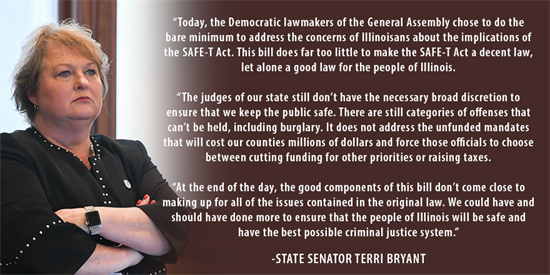Controversial SAFE-T Act undergoes changes, but public safety concerns remain
In the final week of the annual fall veto session, legislators took up an amendment to House Bill 1095, which made some changes to the controversial SAFE-T Act.
The SAFE-T Act is a major criminal justice rewrite that was passed, despite bipartisan opposition, in a late-night lame-duck session on January 13, 2021. Since its passage, Senate Republicans joined state’s attorneys and law enforcement personnel from across Illinois to sound the alarm on how the law threatens the safety of their communities.
One of the more controversial provisions includes the elimination of cash bail, which is set to take effect statewide beginning January 1, 2023.
Despite the changes approved by the General Assembly last week, which include expanding the types of offenses that are eligible for pre-trial detention, Senate Republicans said the bill still does not go near far enough to fix the many concerns found in the law.
State Senator Terri Bryant noted, among other concerns, that judges still won’t have the broad discretion they need to be able to hold certain dangerous people in jail ahead of their trial. Additionally, the changes found in House Bill 1095 still don’t address the millions of dollars this law will cost local governments and police departments.
House Bill 1095 was approved by a strictly partisan vote and is now awaiting the Governor’s action.

UI Trust Fund payoff will cost businesses more
An agreement between the business and labor communities was reached last week to address the outstanding loan balance to the Illinois Unemployment Insurance Trust Fund. The state took out the loan during the pandemic to help pay the unprecedented number of unemployment claims.
During the final day of the fall veto session, lawmakers voted on an agreement to pay off the remaining $1.363 billion debt using unexpected, one-time revenue the state is expected to receive this fiscal year.
Sen. Bryant said she had strongly advocated for the use of federal COVID-19 funding to pay the entire deficit last spring, just as 31 other states did, to avoid any tax increase on businesses. Instead, Gov. JB Pritzker and Democratic leaders refused to pay the full deficit ahead of a tax increase kicking in and spent much of the federal money on pork projects.
Time to renew! License and permit extensions come to an end

Residents across the state are now required to renew their driver’s licenses on the actual renewal date following an end to a two-year long extension period resulting from COVID-19.
The first extension came in early 2020 because of the closure of several businesses and state agencies. Several more extensions were granted until Secretary of State Jesse White announced the final deadline extension would come to an end December 1, 2022.
The renewal deadline includes those with driver’s licenses, ID cards and permits, but does not apply to commercial driver’s licenses or CDL learner’s permits.
Although Secretary of State offices have since reopened following the pandemic, the state agency is still encouraging people to complete the renewal process online at https://www.ilsos.gov/. Lobbies at the facilities are currently open but may require an appointment depending on its location.

